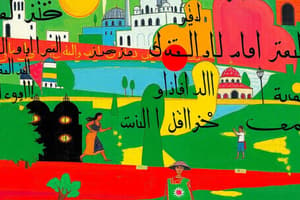Podcast
Questions and Answers
What does the term 'Muslim' mean?
What does the term 'Muslim' mean?
A follower of Islam, means 'one who has submitted'.
What is Islam?
What is Islam?
A religion based on the teachings of the prophet Mohammed which stresses belief in one god (Allah), Paradise and Hell, and a body of law written in the Quran.
What is the term for the migration of Muhammad and his followers from Mecca to Medina?
What is the term for the migration of Muhammad and his followers from Mecca to Medina?
- Hajj
- Umrah
- Hirjah
- Hijra (correct)
Who is Muhammad?
Who is Muhammad?
What is the Quran?
What is the Quran?
What does 'Allah' mean?
What does 'Allah' mean?
What is Monotheism?
What is Monotheism?
What is the Sunna?
What is the Sunna?
What is Shari'a?
What is Shari'a?
Who are the Ulama?
Who are the Ulama?
What is the role of a Caliph?
What is the role of a Caliph?
What is Jihad?
What is Jihad?
Who were the Abbasids?
Who were the Abbasids?
What is the Shi'a sect?
What is the Shi'a sect?
What is the Sunni branch of Islam?
What is the Sunni branch of Islam?
What is Sufism?
What is Sufism?
What is Judaism?
What is Judaism?
What is the Ka'ab?
What is the Ka'ab?
Who was Khadijah?
Who was Khadijah?
The five pillars of Islam include profession of faith, 5 daily prayers, paying zakat, fasting during the month of Ramadan, and __________.
The five pillars of Islam include profession of faith, 5 daily prayers, paying zakat, fasting during the month of Ramadan, and __________.
Where is Mecca located?
Where is Mecca located?
What is Medina known for?
What is Medina known for?
What is the Arabian Peninsula?
What is the Arabian Peninsula?
Flashcards are hidden until you start studying
Study Notes
Key Terms in Islam
- Muslim: A follower of Islam, meaning "one who has submitted."
- Islam: A monotheistic religion founded by Prophet Muhammad, emphasizing belief in one God (Allah), and teachings delineated in the Quran.
- Hijrah: Refers to Muhammad's migration with followers from Mecca to Medina, marking a pivotal moment in Islamic history.
- Muhammad: The last prophet in Islam, known for receiving revelations from the Archangel Gabriel. His life teachings are compiled in the Hadith and he is seen as the founder of Islam.
- Quran: The holy book of Islam, believed to contain God's revelations to Muhammad during his life.
- Allah: The Arabic term for God in Islam, regarded as the sole deity.
Core Concepts of Islam
- Monotheism: Central belief in the existence of one God.
- Sunna: The model for living based on Muhammad's teachings and practices, forming a key part of Islamic tradition alongside the Quran.
- Shari'a: Islamic law derived from the Quran and Sunna, governing all aspects of a Muslim's life.
- Ulama: Scholars and officials in Islam responsible for interpreting the Quran and Shari'a, shaping public policy.
Islamic Leadership and Sects
- Caliph: The title for the supreme political and religious leader in a Muslim government, viewed as the successor to Muhammad.
- Jihad: Refers to a holy struggle for moral or spiritual goals, often misconceived as solely a holy war.
- Abbasids: A dynasty that overthrew the Umayyads; ruled the Muslim Empire from 750 to 1250, later destroyed by Mongol invasions.
- Shi'a: The second-largest sect in Islam, originating from a dispute over leadership, believing Ali, Muhammad's cousin, should be the rightful Caliph.
- Sunni: The largest branch of Islam, recognizing the first four caliphs as legitimate successors of Muhammad.
Cultural and Historical Context
- Sufi: Members of a mystical branch of Islam known for spirituality, poetry, and practices differing from mainstream Sunni beliefs.
- Judaism: The main religion practiced in Israel, related to Islamic teachings and cultural heritage.
- Ka'ab: The most sacred shrine in Islam located in Mecca, known for its cube shape, central to Islamic pilgrimage.
- Khadijah: Muhammad’s wife, a wealthy businesswoman who played an essential role in his life and career.
- Five Pillars of Islam: Fundamental acts of worship in Islam, including the declaration of faith, daily prayers, almsgiving, fasting during Ramadan, and pilgrimage to Mecca.
Geographical and Historical Significance
- Mecca: Birthplace of Muhammad and the holiest city for Muslims.
- Medina: The city Muhammad fled to after leaving Mecca, known as the "City of the Prophet."
- Arabian Peninsula: Birthplace of Islam; strategically located at the crossroads of three continents and surrounded by significant bodies of water.
Studying That Suits You
Use AI to generate personalized quizzes and flashcards to suit your learning preferences.




